BT offers full fibre broadband with download speeds of up to 900Mbps. Find out how it’s installed, get free set-up, and see the best reward card deals.
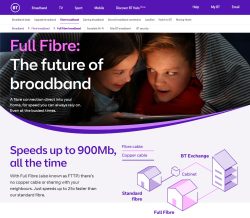 In the UK, BT offers a full fibre (FTTP) broadband service with download speeds of up to 900Mbps. It uses a fibre optic connection that goes all the way into your home, giving you faster download speeds and a more reliable connection.
In the UK, BT offers a full fibre (FTTP) broadband service with download speeds of up to 900Mbps. It uses a fibre optic connection that goes all the way into your home, giving you faster download speeds and a more reliable connection.
You’ll be able to choose from a range of download speeds on BT’s full fibre service, including Full Fibre 150, Full Fibre 300, Full Fibre 500, and Full Fibre 900.
In this article, we’ll look at BT’s full fibre broadband, including how it’s installed in your home and the benefits compared to regular fibre broadband. We’ll also look at how you can get an exclusive BT reward card when you sign up.
Get a £160 reward card on BT Full Fibre →
| Plans From: | £24.99 per month |
|---|---|
| Download Speed: | 50Mbps – 900Mbps |
| Upload Speed: | 9Mbps – 110Mbps |
| BT Full Fibre Exclusive Deals: |
Monthly cost will rise each April by £4 |
| Requirements: |
|
Contents
What is BT Full Fibre?
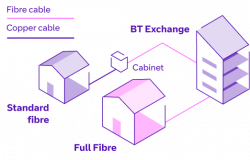 In the UK, what we’ve traditionally called as a “fibre broadband” connection should more accurately be described as a part-fibre or fibre-to-the-cabinet (FTTC) connection.
In the UK, what we’ve traditionally called as a “fibre broadband” connection should more accurately be described as a part-fibre or fibre-to-the-cabinet (FTTC) connection.
With fibre-to-the-cabinet, a fibre optic cable runs from the telephone exchange to a cabinet near your home. The final section (the “last mile”) between the cabinet and your home uses a copper phone line. Because of this, your download speeds will rarely go above 67Mbps.
In contrast, full fibre broadband (also known as fibre-to-the-premises or FTTP) uses a fibre optic cable that goes all the way into your home. There are five major benefits to this:
- You’ll get faster download speeds. BT’s full fibre service is up to 15 times faster than their part-fibre service.
- You can use more devices at the same time on full fibre. With full fibre, there’s capacity for more devices to be using your broadband connection at the same time. That means you can stream, game, work and play on more devices at the same time. You can also keep all of your smart home devices connected to the internet.
- There are fewer slowdowns and less disruption on full fibre. Part-fibre broadband uses a copper cable for the final part of the connection into your home. This can sometimes be susceptible to noise and interference. In contrast, full fibre broadband isn’t susceptible to these problems.
- You’ll get a lower latency connection. With full fibre, you’ll normally get a lower amount of latency or ‘lag’ on your connection. According to Ofcom (the UK’s telecommunications regulator), the typical latency on BT’s full fibre service is about 8ms. This compares with 10-12ms for part-fibre broadband and 15-35ms for copper broadband. The lower latency should give you a more responsive experience, especially when you’re playing games online.
- Full fibre is better for the environment. The copper cables used for regular fibre broadband make use of an increasing rare and precious metal. Furthermore, these copper cables use a lot of electricity to keep them powered and to carry data on the line. In contrast, full fibre is much more energy efficient. According to BT, the energy saved by upgrading the country to full fibre technology will be enough to power 175,000 homes.
As of 2025, around half of all UK homes are now able to get BT’s full fibre service. You can check the availability at your address on BT’s website.
How is BT Full Fibre Installed?
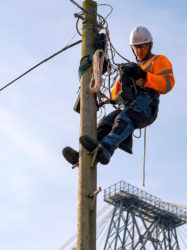 As full fibre (FTTP) broadband uses a fibre optic cable that goes all the way into your home, you’ll need an engineer visit to install the fibre optic cable (that’s unless you already have one in your home).
As full fibre (FTTP) broadband uses a fibre optic cable that goes all the way into your home, you’ll need an engineer visit to install the fibre optic cable (that’s unless you already have one in your home).
If you’re able to place an order for full fibre broadband, this means a fibre optic cable will have already been laid to a telephone pole or an underground duct near your home. This means the engineer only needs to do the final part which is to connect your home up to this existing full fibre network.
When you place your order with BT, the service will be installed as follows:
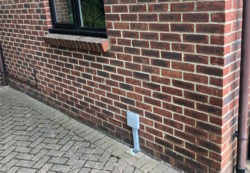 The engineer will put in a new fibre optic cable to the outside of your home. Usually, this new fibre optic cable will follow the path of your existing copper phone line. This means, for instance, they’ll run a fibre optic cable through the existing underground duct if you have one for your old copper phone line. Alternatively, they’ll just connect you to the full fibre network using an overhead cable that replaces your existing copper phone line.
The engineer will put in a new fibre optic cable to the outside of your home. Usually, this new fibre optic cable will follow the path of your existing copper phone line. This means, for instance, they’ll run a fibre optic cable through the existing underground duct if you have one for your old copper phone line. Alternatively, they’ll just connect you to the full fibre network using an overhead cable that replaces your existing copper phone line.- A small junction box will be installed on the outside of your home. This is where the fibre optic cable will end on the outside of your property. Also known as the Customer Service Point (CSP), it’s a small box that measures about 15cm x 13cm in size.
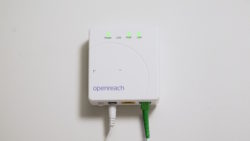 A full fibre modem will be installed inside your home. This is a wall-mounted modem. It’s a bit like the master socket you’d find on an analogue phone line, but it’s a little bit bigger (about 13cm x 11cm in size). As it needs to deal with digital signals over a fibre optic connection, this needs to be plugged in to a power socket to work. The full fibre modem is also referred to as a Optical Network Termination point (or ONT for short).
A full fibre modem will be installed inside your home. This is a wall-mounted modem. It’s a bit like the master socket you’d find on an analogue phone line, but it’s a little bit bigger (about 13cm x 11cm in size). As it needs to deal with digital signals over a fibre optic connection, this needs to be plugged in to a power socket to work. The full fibre modem is also referred to as a Optical Network Termination point (or ONT for short).- A small amount of drilling will be required to connect the outside junction box to the inside modem. To connect the external junction box (the CSP) to the internal modem (the ONT), a small hole will be need to be drilled through the wall. This hole will be about 12mm wide. A fibre optic cable will be fed through this hole, connecting the two boxes and bringing the fibre optic connection into your home.
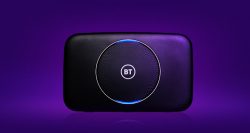 Your Smart Hub router can then be plugged in. To complete the installation, the engineer will then connect your new BT Smart Hub router to the modem. That’ll provide you with a wi-fi connection that you can use from other devices.
Your Smart Hub router can then be plugged in. To complete the installation, the engineer will then connect your new BT Smart Hub router to the modem. That’ll provide you with a wi-fi connection that you can use from other devices.
In total, it takes about three hours to get your home connected to full fibre. Once that’s done, you’ll be able to switch between full fibre plans in the future without the need for another engineer visit.
BT Full Fibre Deals
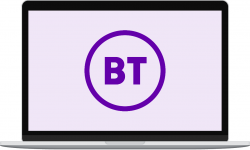 Normally, there’s an upfront fee of £31.99 to get BT’s full fibre broadband.
Normally, there’s an upfront fee of £31.99 to get BT’s full fibre broadband.
However, as a special offer, it’s currently possible to get £0 installation, plus up to a £160 reward card through these exclusive deals from BT:
| Service | Download Speed | Monthly Cost (will rise each April by £4) |
|
|---|---|---|---|
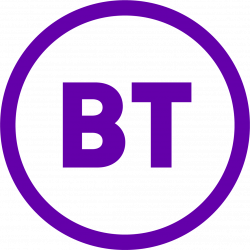 Fibre 2 | 75Mbps average download | £25.99 per month No upfront fee £60 reward card 24 month contract | See deal |
 Fibre 1 | 50Mbps average download | £25.99 per month No upfront fee 24 month contract | See deal |
 Full Fibre 150 | 150Mbps average download | £27.99 per month No upfront fee £80 reward card 24 month contract | See deal |
 Full Fibre 500 | 500Mbps average download | £30.99 per month No upfront fee £90 reward card 24 month contract | See deal |
 Full Fibre 300 | 300Mbps average download | £30.99 per month No upfront fee £85 reward card 24 month contract | See deal |
 Full Fibre 900 | 900Mbps average download | £34.99 per month No upfront fee £160 reward card 24 month contract | See deal |
The reward card will be sent to your email address around 14 days after your full fibre broadband service is set-up. It’s a prepaid Mastercard that you can use for your shopping online, anywhere that Mastercard is accepted.
If you need a home phone service, this is available from an extra £5 per month and will be provided using Digital Voice technology.
BT Full Fibre Speeds
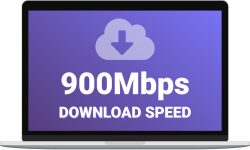 At present, BT offers a choice of six download speeds on their full fibre broadband service:
At present, BT offers a choice of six download speeds on their full fibre broadband service:
| BT Broadband Plan | Average Download Speed | Average Upload Speed |
|---|---|---|
| Full Fibre 1 | 50Mbps | 9Mbps |
| Full Fibre 2 | 75Mbps | 18Mbps |
| Full Fibre 150 | 150Mbps | 30Mbps |
| Full Fibre 300 | 300Mbps | 49Mbps |
| Full Fibre 50 | 500Mbps | 73Mbps |
| Full Fibre 900 | 900Mbps | 110Mbps |
If you’re trying to decide on a plan, it’s worth thinking about what you’ll do with your home broadband service. More specifically, you’ll need to choose the download speed that can handle the maximum number of devices you’ll use at the same time.
For most households, streaming online video is the most bandwidth-heavy activity. You’ll need about 5Mbps for a HD stream and about 25Mbps for an Ultra HD (4K) stream. For instance, if you wanted to stream ultra HD video on 6 devices at a time, you would need a 150Mbps full fibre connection.
BT Full Fibre Hub
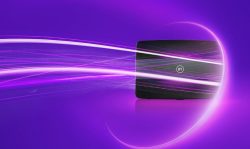 When you sign up for BT’s full fibre broadband, you’ll receive a Smart Hub 2 router to use with the service. This will produce a Wi-Fi network through your home for other devices to connect to. You’ll also get 4 Gigabit Ethernet sockets for connecting wired devices to your home network.
When you sign up for BT’s full fibre broadband, you’ll receive a Smart Hub 2 router to use with the service. This will produce a Wi-Fi network through your home for other devices to connect to. You’ll also get 4 Gigabit Ethernet sockets for connecting wired devices to your home network.
If you add BT’s home phone service using Digital Voice technology, the Smart Hub 2 will also give you DECT wireless connectivity for connecting a cordless home phone.
The following table shows the technical specifications of BT’s Smart Hub 2 router:
| BT Smart Hub 2 | ||
|---|---|---|
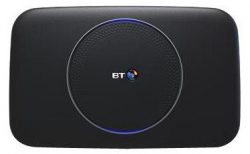 |
||
| Availability | ||
| BT Broadband Plans: | Full Fibre 150 Full Fibre 300 Full Fibre 500 Full Fibre 900 |
|
| Connectivity | ||
| Dual-Band Wi-Fi: | Yes | |
| Wi-Fi Connectivity: | Wi-Fi 5 (802.11a/b/g/n/ac) | |
| Wi-Fi Speed: | Up to 2022Mbps total | |
| 2.4GHz Wi-Fi: | 3×3 MIMO (up to 289Mbps) | |
| 5GHz Wi-Fi: | 4×4 MIMO (up to 1733Mbps) | |
| Mesh Wi-Fi: | Yes (requires BT Complete Wi-Fi) | |
| Ethernet: | 4 Gigabit Ethernet ports | |
| Phone (Digital Voice): | 1 FXS phone port 2 DECT antennas |
|
| USB ports: | 1 USB 2.0 port | |
| Other: | WPA2 / WPA security Built-in firewall Automatic channel selection & optimisation |
|
| Other | ||
| Colour: | Black | |
| More Information: | BT Website | |
In addition to the Smart Hub 2 router, you’ll get an Openreach modem installed in your property, unless you have one already. This is also known as the Optical Network Termination unit (ONT).
More Information
For more information about BT’s full fibre service, see their official website. You can also read our guide on BT’s reward card deals.
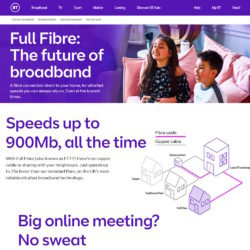
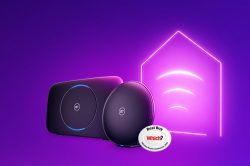
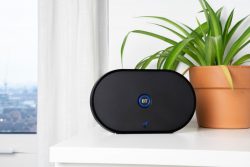
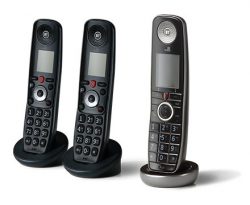
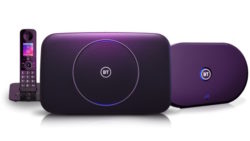
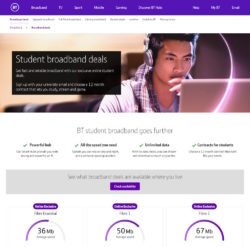
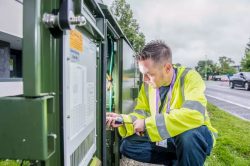

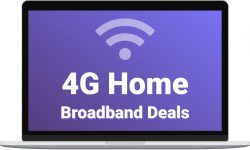

Woody said:
Having recently installed BT Full Fibre 900 I am achieving download speeds of 945Mbps at the hub with 110Mbps upload. We also have 3 booster discs throughout the house. On mobile devices e.g. iPhone and iPads download speeds range from 150 to 350 Mbps depending on location. Upload speeds are consistently > 100Mbps. TV’s steam 4K and UHD without any problems so overall we are very happy. I understand that to achieve higher speeds would require an Ethernet connection directly to the hub which we have not tried and do not need. As a previous comment mentioned wireless speeds will depend heavily on the speed of the device receiving the signal from the hub.
Ajay said:
Ken,
thank you for your informative article.
I was reading this as Open Reach are presently turning my street into a chaotic building site to install FTTP conduit, and I was wondering if it is worth going to full fibre – after the dust settles? In my use case, the answer is a resounding… no.
Why? Our local VDSL FTTC speeds are 80Mbps (60/20), which is a dream speed for many people. The green box is just meters away. Full HD content streams with little or no dropped packets. So unless I want holes in my driveway, with more diggers, more tarmac, more dust, and spend a lot more money, it’s just not worth it.
If I want speed, I’ll await the arrival of 5G and buy a window antenna. But then I have neighbours who think 60Mbps is SLOW and they need more speed, because the “internet is getting faster” and they need to keep up.
As for download speeds, I wish BT would educate the public that those speeds are to the hub (WAN side). Their device speeds (LAN side) are their problem. Faster internet will NEVER make a slow device run faster, even if ‘broadband experts’ tell you it does.
AJay
Ray Proudfoot said:
Hi Ken. Useful article, thank you. I switched to the 900 package two weeks ago and whilst I can download at 900Mbps on a Ethernet connected PC the download speed on a 6 year-old iPad is only 88.5Mbps. But the upload speed on the iPad is 106Mbps.
The iPad is via Wi-fi of course but the SmartHub 2 is in a bedroom right above me plus there’s a BT Disk in the lounge 3 metres away from my position. Signal strength is excellent.
On my previous BT package – FTTC – download speeds via Ethernet and Wi-fi were very close around 50Mbps. I’m struggling to understand why my download speeds via Wi-fi appear to be throttled compared to uploads. I’m the only user in the house.
Running the same test on a 2 year-old Android smartphone gives me 140/110. It seems very dependent on kit. Hope you can throw some light on things.
Andrew Youll replied:
All WiFi devices conform to varying standards known as the 802.11 Family, there is:
– 802.11a
– 802.11b
– 802.11n
– 802.11ac
– 802.11ax
and within these standards there are sub standards such as MiMo, which depends on number of antennas etc. as such not all devices are equal, over wifi it is generally your device you are using that is the limiting factor.
Jeff Griffin said:
Hi Ken,
We were upgraded to BT Full Fibre 900 with BT Halo 3 last week (sold as 900DL / 110UL) and now have dramatically better internet service now. I’ve able to get over 800Mbps download speeds but it is clear that BT or Openreach are capping the available upload speeds to 50Mbps and expressly not delivering on their marketing promise of 110Mbps.
I’ve raised the issue with BT and because we are above their minimum upload of 10Mbps, they don’t seem to think there’s any issue and they won’t take any steps to remedy the promised UL speed.
Do you have any advice to remedy this? Full disclosure, I am an American ex-pat and don’t yet have a solid grasp of how these things work here in the UK and how to resolve after getting the run around from BT for over 2 hours. Any advice would be much appreciated.
Best regards,
Jeff
Andrew said:
I think this review, like many others misses a crucial (and some might say misleading) point. The speeds quoted by BT refer only to wired (ethernet) connections. if you are on full fibre 900 you will be lucky to get a third of the quoted speeds via wi-fi even if you are stood over the Smart Hub 2
Ray Proudfoot replied:
Andrew, yes, I understand that but my Wi-fi download speeds are slower than uploads. 88 versus 106.
That’s on a six year-old iPad. They’re faster on a newer Android smartphone so it seems Wi-fi download speeds are highly dependent on kit.
JP said:
Can you let us know please about usage caps?
There is a great deal of information about speed and guaranteed speeds (thank you), can you also inform us of any limits for usage (Ultrafast 100/300/900)?
Thank you.
JP
Ken replied:
Hi JP,
All of the full fibre plans should come with unlimited usage with no fair use policy or throttling.
Hope this helps,
Ken
Ade said:
Hi,
Can I get a different router for the full fibre 900 or do I have to get the BT Smart Hub 2 which for instance doesn’t support WiFi 6?
I E said:
Thank you for this information. I have a question to ask that even Vodafone CS reps have not been able to answer.
Currently Openreach offers FTTP in my area and I can see this service on offer from BT. However I cannot see the same from any other provider (Vodafone, Sky, etc).
Vodafone told me that they rely on Cityfibre to provide this service who are still planning rollout in our area.
How does this service coverage work? Is Openreach exclusive for BT or do other providers use the same line?
Ken replied:
Hi there,
Thanks for your comment. Unfortunately, Vodafone currently only provides full fibre broadband on the Openreach network in Birmingham, Bristol and Liverpool. They’re planning to launch it across the rest of the UK soon, but otherwise, it’s only available in 12 other places using the Cityfibre network. For more information, have a look at my guide to Openreach full fibre broadband plans.
Hope this helps,
Ken
Stuart Gibson replied:
Hi, I had a similar issue, only BT shown as fttp available, I was with sky when they started their 150mbps full fibre, but they said it was not available. I think the main thing is, even though fttp is available to my home, the fibre cable was not at my house. So I ordered from BT and an openreach contractor came and installed the fibre to the front of my house. And I will get another openreach engineer to install the services on the appointment day. So in the future I can make the most of both fttc and fttp as both are installed
Steve said:
Hi
I’ve had my Fibre to the home for 2 years. Now out of contract……need to retain a fibre service. Any recommendations ? Do I have to stay with BT?
Thanks
Ken replied:
Hi Steve,
Thanks for your comment. There are a couple of other providers that also offer full fibre on the Openreach network. They include EE, TalkTalk, Sky and Vodafone. If you like, you could compare their full fibre packages against what BT is offering you.
Hope this helps,
Ken
John Kelly said:
Open Reach fibre rollout – how soon is “soon”?
I am in SE14 (London), currently on copper, max speeds on good days, 10M. I learn that we are on the Openreach rollout plan for FTTP, (full fibre) coming “soon”. I’m dimly aware that this rollout has been going on for some years, so I don’t know if “soon” means, next 6 months, or next 6 years. My question to you, do you have any better guess as to what “soon” means?
PS, thanks for your info here on fibre; so much clearer and to the point than BT’s sales pages.
Ken replied:
Hi John,
Thanks for your feedback, and I’m really pleased that you found this information to be helpful! Regarding the rollout of full fibre, I unfortunately don’t have any information about how it affects individual areas. They’ve pledged to deliver full fibre to 20 million homes by the mid-to-late 2020s, which could mean anything from 2025 to 2030 (leaving aside the fact it doesn’t tell you which 20 million homes will be covered, and the uncertainty about how BT/Openreach is going to pay for it all). The best thing to do would probably be just to keep an eye out for local works/news/announcements, and hoping for some good news soon! Alternatively, there are also quite a few other full fibre providers launching in London (Community Fibre, G.Network, etc) so keep an eye out for announcements from those companies as well.
Ken
Chris S replied:
Hi John,
I’m also SE14 (New Cross, London). I noticed Instalcom workmen laying fibre cable down one end of my street on 6 August 2020 and where back agin 2 October laying yellow fibre cable directly outside my house!
I asked one of the contractors about it and he said they usually cable a whole neighbhood first before they “switch it on”. He had no idea how long that would be.
I’m guessing it will surely be live within the next 12 months…. fingers crossed, I’m so sick of Virgin media’s unreliable DOCSIS cable internet and ADSL is so slow.
Chris
stwi said:
So I’ve been offered free upgrade no cost for 24 months to Full Fibre 100 (already have FTTC). They dont make is clear whether I can downgrade back to FTTC after 24 months if I don’t want to pay whatever the charge will be then. Also my current number I brought from different property and is on a different exchange to my nearest, so always had slower speeds. Guess this doesnt matter now with FTTP or should I ask to change number to maximise speed?
Ken replied:
Hi Stwi,
Thanks for your comment. I believe BT are probably offering you a free upgrade as they want to move people over to their full fibre service. This will ultimately save them money in the long-run as they’re looking to switch off the old FTTC/copper network. For this reason, I’m not sure whether there’ll be a FTTC service for you to go back to in your area in 24 months time! Saying that, they currently offer equivalents of all their FTTC plans through a Full Fibre service so you shouldn’t be disadvantaged by this (i.e. you could get FTTC equivalent speeds through your Full Fibre connection at the exact same cost).
Hope this helps,
Ken
Joe Pineapples replied:
Hi. Can I ask which FTTC package you were on when they offered the free upgrade?
Joe Pineapples replied:
Looks like I can ‘ask’ 😉
Andy Turfer said:
Unfortunately for me, Virgin Media already service my apartment block, so BT won’t touch it. This infuriates me – it’s like there’s competition, but there’s not. Once Virgin Media had an apartment block covered, no other providers step in to offer an alternative (choice). So for me (and millions like me), there is no competition.
Tolu Ogunleye said:
Hi
I want to know if the BT Fiber 100 is unlimited Wi-fi
Ken replied:
Hi Tolu,
Thanks for your comment. Are you asking about access to BT Wi-Fi hotspots? If so, yes, it should give you access to these 🙂
Ken
Damien McKeand said:
Great website Ken!
Really useful information. I have just upgraded to the BT 900 deal. I was told by a friend that the 500 deal was pulled by BT in order to get people to buy the 900.
Well I phoned (27/6/20) them to sort out a deal but they had all the speeds available, 100, 300, 500, 900.
They are however pushing the 900 deal in that it was cheaper than the 500!
So, my bundle is: 900 full fibre plus the Complete Wi-Fi service for £56.99!!! Amazing deal.
The BT guy I spoke to reminded me to make sure I get all 3 discs from BT as the 2nd 2 are free as you said in your article.
Burble said:
I may have missed something in skimming through the article, but BT FTTP plans start at 50Meg and £28.99/m I’m not sure if this is universally available, but it is to those of us who can’t get those speeds with FTTC.
Ken replied:
Hi Burble,
Thanks for your comment. That’s a really good point there. I hadn’t included the 50Mbps plan in this article as I considered it to be a standard FTTC plan. But it’s a good point that might still be offering their those plans & speeds, but delivering it through full fibre if that’s available at your address. Will definitely have a think about how we can make this a bit clearer.
Ken